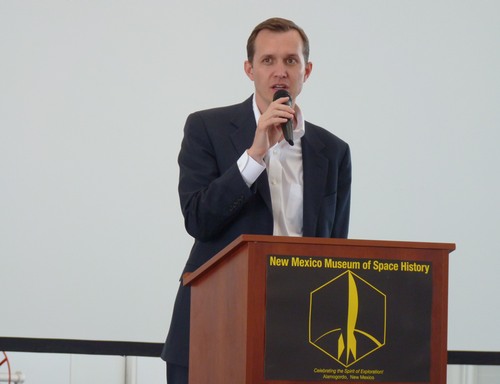
Virgin Galactic CEO George Whitesides speaking Friday at the DC-X 20th anniversary event at Spaceport America in New Mexico. (credit: J. Foust)
After a hiatus of more than three and a half months that has raised questions by some industry observers, Virgin Galactic is making preparations for a second powered test flight of its SpaceShipTwo suborbital vehicle, the company’s CEO said Friday.
Speaking at the DC-X First Flight 20th Anniversary and Aerospace Workshop on Friday at Spaceport America in New Mexico, Virgin Galactic CEO George Whitesides indicated that a powered test flight for SpaceShipTwo was upcoming. “We’re gearing up for our second powered flight,” he said, but offered no specifics on the date.
SpaceShipTwo made its only powered flight to date on April 29, firing its hybrid rocket motor for 16 seconds. The vehicle “performed as expected,” the company said at the time, something Whitesides reiterated on Friday. “The first one went very well. We didn’t have any weird ‘flutter’ or anything through supersonic.”
The lack of powered flights since that April test though—SpaceShipTwo has made two glide flights, on July 25 and August 8, according to the vehicle’s public test logs—has generated speculation regarding the long delay. Much of that speculation has focused on the hybrid engine, which has performed two static firings since the April flight, one that Scaled Composites said had flaws “intentionally” introduced into it to test safety systems.
Whitesides said the second and successful powered flights of SpaceShipTwo will fire the engine for longer than April’s 16-second burn. “You’ll see us add time to the burn over the next few test missions,” he said. “Then we’ll do a few more test missions early next year to simulate the customer experience, then we should be ready to start commercial service.” He said later there was not a firm number of powered test flights planned before commercial flights begin. “We have an idea that it’ll be less than 20,” he said, “but we’ll have to see how the test program goes.”
Speaking on Tuesday at the AIAA/USU Conference on Small Satellites in Logan, Utah, Virgin Galactic vice president Will Pomerantz offered a similar view of the state of SpaceShipTwo’s development. “We are now getting really, really close,” he said in a talk devoted primarily to Virgin Galactic’s LauncherOne smallsat launcher. “We’re now looking to be in space, with people but not with paying passengers on the vehicle, by the end of this calendar year, and to begin commercial service, both for our space tourists and for our space researchers and educators, around the middle of next year.”
Whitesides also offered a few comments on Virgin Galactic’s business. He said the company had now signed up about 625 people for suborbital flights, accounting for $125 million in business. That works out to $200,000 per customer, but Whitesides did note that Virgin Galactic had raised its ticket price to $250,000, as the company confirmed back in May. Those customers come from 54 countries, and range from “teenagers to 88 years old,” he said. “We think we can make a really good business out of that.”

From “teenagers to 88 years old.”
Yeah, and I bet 90% of them are male. This is where the market in this industry is limited.